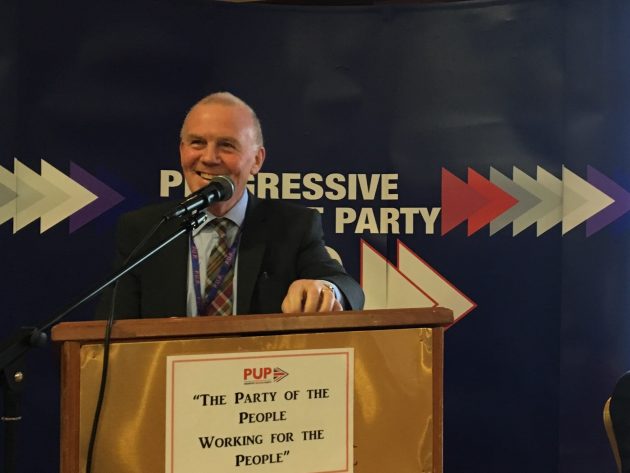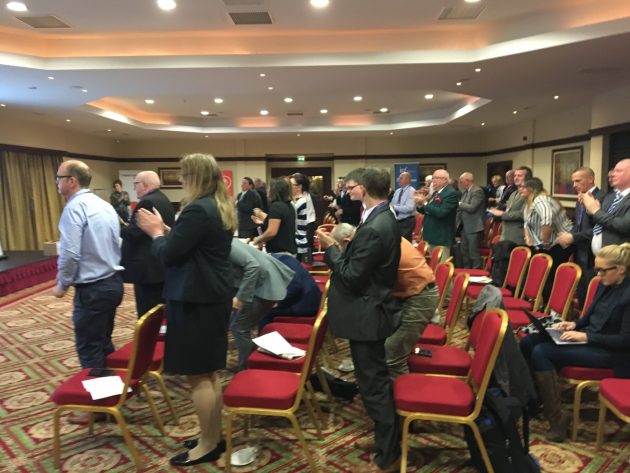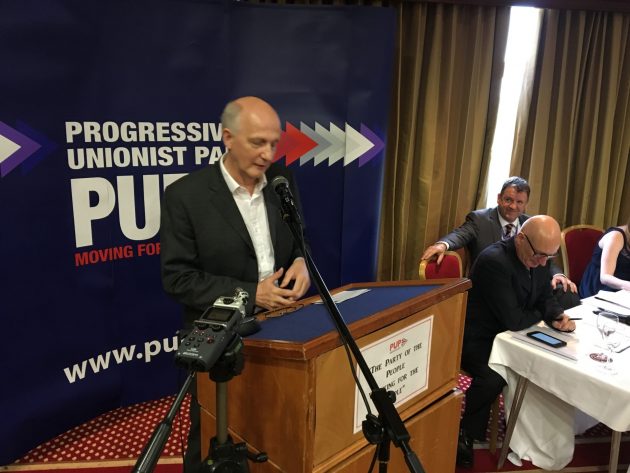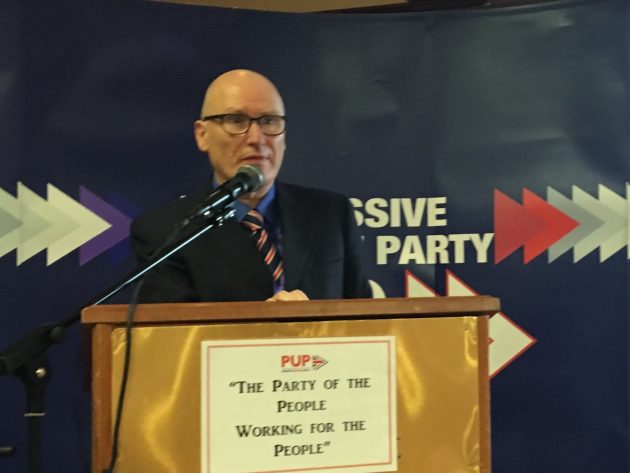The atmosphere at the PUP conference varies from year to year. Numbers were down at today’s event with around 60 delegates at the Corr’s Corner Hotel. But the more obvious change was the shifting demographic. Far fewer bandsmen in attendance than the previous two or three years (there is a contest in Scotland this weekend), but most noticeably a surge of women – of all ages – attending, participating and seeking election to party positions.
While many of the elected party positions were uncontested (Billy Hutchinson and John Kyle back as leader and deputy leaders), two roles were subject to an elections. It was one example of normal party politics in action with two women standing to be Party Electoral & Nominations Officer and two men for Party Organiser and Membership Officer. For the first time, oral reports from the treasurer, membership, communications and training gave party members a glimpse into the working of the party and a chance to hear a wider set of voices within the PUP’s leadership.
Speaking after lunch, Alex Kane encouraged the party to “sound upbeat and not whingey”, adding that it wasn’t enough to say that other parties are not delivering. Instead the PUP needed to tackle its perceptions and historical baggage head on or else face being politically ignored.
The elephant in the room of continued paramilitary action on the streets in some parts of Northern Ireland was addressed tangentially. The recent resolution of the parading dispute at Twaddell went unmentioned. Alex Kane was the first person to mention flags in a conference that returned to small ‘p’ progressive issues topics in its motions.
Over the last four or five years, the Green Party NI successfully honed their message, built up their electoral capacity and were able to run eighteen credible candidates at the most recent Assembly election. The PUP could learn from the example. The signs were there today that there is a mood within key party activists to further professionalise the party and increase its impact.
If the criminal justice system finally gets on top of paramilitarism and a political solution is found to address legacy issues, there is an opportunity over the next few years for the PUP to concentrate on social and cultural issues. Normally a BBC camera crew turns up to make a short report about the conference for Monday’s Newsline. Their absence this year underlines the poor showing of the party in May and is a reminder to the party that their 4 councillors are now overshadowed by People Before Profit’s two MLAs in the political party representation maths.
While not a hurdle to be faced in the immediate future, ultimately the process of reimaging and resetting perceptions will involve changing the most public face of the party, its leader. The track record of PUP leaders without a paramilitary record has been a little patchy in terms of carrying the support of the width of the party. Anyone taking on or seeking the role needs a clear strategy to address that predictable conundrum.
Deputy leader Councillor John Kyle spoke for sixteen minutes. During the Assembly election campaign the party “believed that the election would be a step up [and the party] would make a greater impact on Northern Ireland”.
Well, it didn’t happen. We didn’t achieve our ambitions. Let’s be honest, the DUP played the sectarian card and that damaged us. There are a number of reasons why we didn’t break through and have 1, 2 or 3 MLAs elected.
The DUP’s intervention had “spooked the unionist community” and the election result “left us deflated and damaged”.
The East Belfast GP explained that “defeat and trauma doesn’t inevitably lead to a negative outcome”. Just as Post Traumatic Stress is a real disorder, Post Traumatic Growth is also real and can see “people emerging stronger after trauma”. He suggested that this was applicable to both the PUP and more widely to Northern Ireland. The party needed to “recognise and adjust to new realities, a changed sense of priorities and recognition of new possibilities”.
New possibilities and new opportunities stand before us as a party. People appreciate what the PUP has achieved over the last 40 years: peace process, political process, local communities and local government. PUP has made a significant contribution. But clearly we need to convince the electorate that we can do the business in regional government and that we can deliver.
 John Kyle asked what distinguishes us from other parties? He highlighted three aspects to the PUP’s vision, starting with a “Northern Ireland built on a foundation of social justice”.
John Kyle asked what distinguishes us from other parties? He highlighted three aspects to the PUP’s vision, starting with a “Northern Ireland built on a foundation of social justice”.
We’re committed to tackling the inequality, poverty and lack of opportunity and discrimination that exists … Those need to be addressed and frankly I don’t see other unionist parties tackling those inequalities.
His second point was that “the PUP believes that everyone does better when those who are least well off and at the bottom of the pile do better. When those with most obstacles to overcome, do well and achieve … then the outcome is that all of society benefits and Northern Ireland thrives”.
He quoted Billy Mitchell who believed that the social and economic wellbeing of the people of Northern Ireland should be as important to unionists as the maintenance of the Union.
Too many children are failing in school. Too many people in the workforce have no recognised formal qualifications. Too high a level of chronic ill-health. Too many economically inactive. Too many relying on welfare benefits.
Despite unionist parties being in power for decades, those societal inequalities still need to be addressed.
Thirdly we’re unashamedly and unambiguously unionist. We’re proud to belong to a United Kingdom that is a union of four nations that are diverse, culturally rich and inclusive … We think the United Kingdom is a great and unique concept, it’s something to be proud of: it’s rich, it’s tolerant, it’s creative, it’s inclusive, it’s economically vibrant and we want to be a part of that.
John Kyle felt that the PUP’s goal should be “a Northern Ireland where everyone can flourish and isn’t riven by division”.
Our priorities include ensuring there is an implementation of a living wage, let’s deal with zero hours contracts. An action plan to address fuel poverty including cavity wall insulation. An end to the socially divisive and educationally counterproductive practice of academic selection at the age of 11 … And support for community education and particularly in the women’s sector.
The party’s director of communications, Sophie Long, said that the PUP needed to “get out messages that we have previously been quite poor at expressing”.
The media don’t like us and the media mistreat us. The media are harsher on members of this party that the UUP or DUP.
She spoke of the party being disrespected and undermined and said that the “task is to make us respectable again”. To reject and ignore the media mistreatment would be “complicit in our own marginalisation”. Instead, to transform perceptions, party members needed to take hurtful criticism carefully, and “rehumanise loyalism in the eyes of the media and the eyes of the potential electorate”.
Sophie Long encouraged members who are doing good work every day – finding people houses, dealing with tax credit issues, diverting young people away from interfaces, dealing with people mainstream unionism has left behind – to have the confidence to speak out for themselves.
“People don’t have to speak for you; have the confidence to speak.”
Motions on women’s health provision, rent control, self harm and suicide, welfare sanctions and legacy issues were proposed and debated. A motion on domestic violence – calling for the implementation of the legislation – turned out to be contentions with some members were hesitant to support what they saw as a motion whose name was skewed towards women victims of domestic abuse that didn’t recognise male victims. The motion was carried by the narrowest of margins, 22 to 21 with some abstentions. A later motion on assisted dying was defeated.
Party leader Cllr Billy Hutchinson began his address by noting the 22nd anniversary of the declaration of the Loyalist ceasefire.
October 94 was not the beginning of Loyalist involvement in the process but the culmination of it. The words of the ceasefire declaration were in themselves visionary. Words that offered with an inherent magnanimity that set the context for a process that so often failed to honour by the generosity epitomised in those words.
Today I want to repeat our gratitude and pay tribute to that vision, that commitment , that determination to hold firm in the pursuit of political stability and ultimately of peace. I once again want to recognise the value of loyalist leadership against untold pressure and under lethal threat. I want to recognise the resolve of those who held back the tide of discontent and remained focused on the ultimate goal.
For without that Loyalist leadership, make no mistake about it. We would have no peace. We would have no institutions, and the future for this country would be a lot less bright.
A conflict legacy process which comprehensively and sensitively deals with the past will only work on the basis of social inclusivity, not political exclusivity. I want to put on record that this party believes that victims should be at the centre of any process. By leaving a legacy process to be determined by Political Parties, the past, however defined, will be unworkable. We have already witnessed how a process which should include loyalists has alienated them from discussions about what that will look like and how it might work. This can only hinder the possibility of participation.
Any formal process designed to include a community which excludes them from involvement in that design will not work. This simple and obvious point has been overlooked by the two Governments and the main political parties. There is largely suspicion and hostility about talk on the legacy issues amongst loyalist communities now. A result of bad planning and the inability of governments and parties to grasp that this is a problem very much of their own making.
We accept that the construction of institutions and mechanisms are in a large part, a product of political decision-making but we remain convinced that any attempt by political parties to capitalise on a legacy process will be to the detriment of Northern Ireland in general and destabilising for loyal communities in particular. It must be a process where conditionality is shaped by community participation and social conversation. Without this a legacy process will find no public support except in situations where one community believes it can use such a process against others.
We recognise that loyalism too has to address the influence of paramilitary structures and that this is the most pressing issue for Northern Ireland as a whole now. We also recognise that any attempt to address legacy is bound to fail when the mechanisms and structures of conflict remain in place. Therefore I would argue that the ground has not been prepared for a legacy process, by the two Governments or the Northern Ireland Assembly. This party will not be found wanting on this front we will provide advocacy and political leadership as we did for ceasefires and the peace process.
I want to highlight the excellent work that is being carried out with ex-combatants through the ACT initiative and supported by EPIC in relation to DDR. The work is ground breaking they have excellent processes in place that have been tried and tested. The two organisations are building a new way through Community development and peace building principles. Unfortunately, conditionality remains unclear and the social and political circumstances inhibit a collective and agreed approach to ending the structures of conflict. Given this landscape it is highly unlikely that any legacy process can succeed.
If only the two Governments and politicians could catch up with the Loyalist Community then maybe we could succeed.
The PUP leader criticised the Education Minister who recently “instructed schools to prepare for the Transfer Test”.
A transfer test that recognises capacity in its narrow sense yet determines the course of our young peoples’ future, long before they are able to cope with reckoning of such magnitude. The education system is very clearly broken. The system has failed. The system needs up rooted and changed. Levels of educational under achievement in disadvantage areas are an outrage. For us it is and issue of Equality and it is an abuse of the young persons’ Human Rights.
One statement chimed with the comments commentator Alex kane would later make in his afternoon address to the delegates. Billy Hutchinson said:
We yearn to grasp this issue; we have policies that could bring about real change but it isn’t being listened to by the parties in Government. At the very least they need to listen to the future generations. It seems to me that it is Groundhog Day. We stand at conference annually and nothing seems to change for the better and it doesn’t stop at education.
Our manufacturing base is under threat; recent job losses over the last two years are of grave concern. We need to be ahead of the curve on this. Manufacturing is changing and so must the focus of our manufacturing industry – aided and abetted by Government. Again this is an issue we have called on the Government to take action we still have jobs in this sector being lost and no support from the Executive to implement a Strategy. Remember that when this was voted on in the Assembly, both the DUP and Sinn Féin voted against it.
Instead of lusting after the white elephant of lower corporation tax, the Government would be best served helping those businesses already here, instead of a dubious and costly gamble on those who may never come.
Irrespective of how people in this room voted on Brexit, the length of time it takes to happen the Government need to meet the challenges take the opportunities and get the best deal for the UK. As a Region we need to make sure that we get the benefits that we are due. If a deal is worked out between the UK and the Republic of Ireland we need to protect the border from criminality and illegal immigrants entering the UK.
In terms of Welfare Rights, conference, I want to repeat that this Party is opposed by ideology and principle to welfare reform. Our record is clear to see. This, conference, the highest decision making body in our constitution passed a motion against the current welfare reform 4 years ago. We reinforced that view the following year and in subsequent years.
A concern for this Party is the potential impact of Welfare Reform across Northern Ireland and the need to ensure that the associated Welfare Support Programme and mitigating measures as recommended within the Eileen Evason Report published in January 2016 (findings of the detailed work undertaking by the welfare Reform Mitigations Working Group) be rolled out as a matter of priority. There have already been some delays in the process.
 He praised the work of party activists on the frontline have who have “walked with the most venerable through this nightmare and I want to congratulate all of you for the sterling work in helping people out the other side”.
He praised the work of party activists on the frontline have who have “walked with the most venerable through this nightmare and I want to congratulate all of you for the sterling work in helping people out the other side”.
The amount of work our activists have worked through in terms of advice and correcting mistakes, filling out forms and generally sign-posting people is a credit to all of the people involved. This Party is rich with caring and compassionate people and our community has benefitted from your commitment to tackle problems that has been created by Government who make decisions that are not in the interests of the most vulnerable in our society. I would also like to thank all the workers in the welfare rights sector they have worked tirelessly to ensure people understand the consequences of Welfare Reform in every corner of this Region.
The PUP have four local government councillors.
Conference the Assembly is not the only body which can make decisions in our society there are the Councils with their new powers. Unfortunately, not all of the powers that were promised materialised. Therefore we seek the early transfer of regeneration powers to the Councils, particularly those relating to comprehensive development schemes and compulsory purchase. This party believe that this will provide the important levers to support the physical, economic and social regeneration across the Cities, Towns, Villages and Neighbourhoods. The transfer would enable regeneration functions to be reconnected with land-use planning and the new power of Community Planning. This would further enhance the ability of Councils to develop and reinvigorate their areas, support investment locally, which will grow our economy, create jobs and prosperity and improve the quality of life.
On areas for party focus:
Conference the Progressive Unionist Party wants to act against the persistent poverty and deprivation. The socio-economic problems are no different to other UK cities or those in the Republic of Ireland. The problem is that we have the ‘legacy of the Troubles’. This Party will continue to work to find a better future we will collaborate with others of like mind to find the solutions to improve this society for all its people irrespective of their religion, gender, class, sexual orientation, or political view. It is this Parties belief that there are key areas that need to be tackle to make any progress in the interest of this society we will focus on alternative ways of solving the issues and based on our ideology of how we believe our politics can work. We would expect that peace to be embedded in Northern Ireland we would not be imposing austerity cuts and expect no social consequences on the decades of conflict inflicted on this society.
We will work on the following areas: education; poverty; investment; mental health; infrastructure; legacy; and reconciliation (sectarianism and racism)
He was clear in his support for integration in education:
We spend a lot of money on education, but we should educating all our children together, not in separate schools.
Billy Hutchinson closed his eighteen minute speech by recognising changes to internal mechanisms “to make the party perform better” and applauded “the party officers for driving the change and to the party members for you cooperation in the changes”. Further internal changes in regard to elections will be considered by the incoming party executive.
I would remind conference, elected office is for us, a means to an end. We exist to help and inspire our communities, but can do so better with the levers of electoral influence. We can bring more change, then more office, then deeper change.
This Party is rich with talent and ability of all ages and gender I am proud to be leader of this Party and I am proud to be associated with its members.
Let me ask conference to double our efforts for the people that need social and political change in this society. I have been on a journey in this Party for decades both incarcerated and in freedom and I or this party have not reached our destination.
Together let us complete the journey and liberate the most vulnerable in Northern Ireland.
 Alex Kane was the guest contributor after lunch. He said that with the privilege of writing about politics, he is happy to appear at conferences and stand over his thoughts and be challenged.
Alex Kane was the guest contributor after lunch. He said that with the privilege of writing about politics, he is happy to appear at conferences and stand over his thoughts and be challenged.
He looked back over the party’s emergence, decline and future. He contrasted the party’s perception that “you weren’t fighting for us” with the public treatment of Sinn Féin.
While Alex had many disagreements with the longest-serving party leader, he described David Ervine as a thoughtful, generous and decent man (who recognised what he had done in the past)
Having said that he’d only vote for candidates who canvassed him, Alex admitted that he’d voted in May 2016 for John Kyle. “I feel confident when I hear John Kyle … [but] if you can’t get him elected in his own backyard” of East Belfast then the party needs to address its perception problem.
Alex’s advice was that political parties have to “sound upbeat and not whingey”. It’s not enough to say that other parties are not delivering.
“Decide whether to focus on party growth or delivery of your agenda. They’re not the same thing.”
Alan Meban. Tweets as @alaninbelfast. Blogs about cinema and theatre over at Alan in Belfast. A freelancer who writes about, reports from, live-tweets and live-streams civic, academic and political events and conferences. He delivers social media training/coaching; produces podcasts and radio programmes; is a FactCheckNI director; a member of Ofcom’s Advisory Committee for Northern Ireland; and a member of the Corrymeela Community.
Discover more from Slugger O'Toole
Subscribe to get the latest posts to your email.

